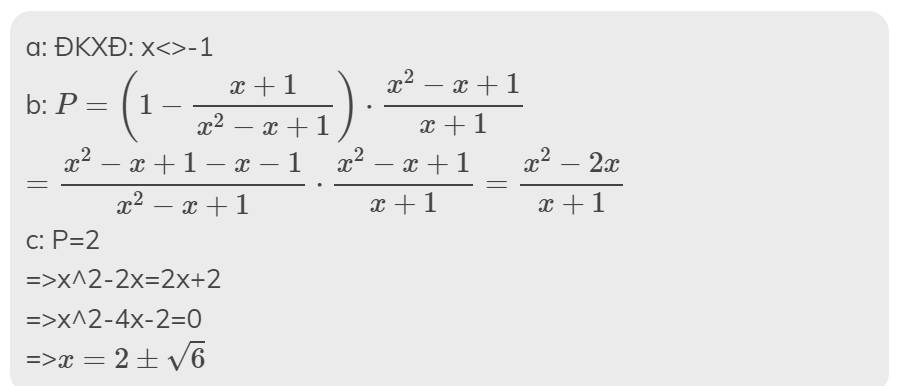Hãy nhập câu hỏi của bạn vào đây, nếu là tài khoản VIP, bạn sẽ được ưu tiên trả lời.

1.a)\(\frac{x^3}{x^2-4}-\frac{x}{x-2}-\frac{2}{x+2}\)
\(=\frac{x^3}{\left(x+2\right)\left(x-2\right)}-\frac{x}{x-2}-\frac{2}{x+2}\)
Để biểu thức được xác định thì:\(\left(x+2\right)\left(x-2\right)\ne0\)\(\Rightarrow x\ne\pm2\)
\(\left(x+2\right)\ne0\Rightarrow x\ne-2\)
\(\left(x-2\right)\ne0\Rightarrow x\ne2\)
Vậy để biểu thức xác định thì : \(x\ne\pm2\)
b) để C=0 thì ....
1, c , bn Nguyễn Hữu Triết chưa lm xong
ta có : \(/x-5/=2\)
\(\Rightarrow\orbr{\begin{cases}x-5=2\\x-5=-2\end{cases}}\Rightarrow\orbr{\begin{cases}x=7\\x=3\end{cases}}\)
thay x = 7 vào biểu thứcC
\(\Rightarrow C=\frac{4.7^2\left(2-7\right)}{\left(7-3\right)\left(2+7\right)}=\frac{-988}{36}=\frac{-247}{9}\)KL :>...
thay x = 3 vào C
\(\Rightarrow C=\frac{4.3^2\left(2-3\right)}{\left(3-3\right)\left(3+7\right)}\)
=> ko tìm đc giá trị C tại x = 3

a, ĐKXĐ: x\(\ne\) 1;-1;2
b, A= \(\left(\frac{x}{x+1}+\frac{1}{x-1}-\frac{4x}{2-2x^2}\right):\frac{x+1}{x-2}\)
=\(\left(\frac{2x^2-2x}{2\left(x+1\right)\left(x-1\right)}+\frac{2x+2}{2\left(x+1\right)\left(x-1\right)}+\frac{4x}{2\left(x-1\right)\left(x+1\right)}\right)\times\frac{x-2}{x+1}\)
=\(\frac{2x^2-2x+2x+2+4x}{2\left(x+1\right)\left(x-1\right)}\times\frac{x-2}{x+1}\)
=\(\frac{2x^2+4x+2}{2\left(x+1\right)\left(x-1\right)}\times\frac{x-2}{x+1}\)
=\(\frac{2\left(x+1\right)^2}{2\left(x+1\right)\left(x-1\right)}\times\frac{x-2}{x+1}\)
=\(\frac{x-2}{x-1}\)
c, Khi x= -1
→A= \(\frac{-1-2}{-1-1}\)
= -3
Vậy khi x= -1 thì A= -3
Câu d thì mình đang suy nghĩ nhé, mình sẽ quay lại trả lời sau ^^
a,ĐKXĐ:x#1; x#-1; x#2
b,Ta có:
A=\(\left(\frac{x}{x+1}+\frac{1}{x-1}-\frac{4x}{2-2x^2}\right):\frac{x+1}{x-2}\)
=\(\left(\frac{x\left(x-1\right)2}{\left(x+1\right)\left(x-1\right)2}+\frac{\left(x+1\right)2}{\left(x-1\right)\left(x+1\right)2}+\frac{4x}{2\left(x-1\right)\left(x+1\right)}\right):\frac{x+1}{x-2}\)
=\(\frac{2x^2-2x+2x+2+4x}{\left(x+1\right)\left(x-1\right)2}.\frac{x-2}{x+1}\)
=\(\frac{2x^2+4x+2}{\left(x+1\right)\left(x-1\right)2}.\frac{x-2}{x+1}\)
=\(\frac{2\left(x+1\right)^2}{\left(x+1\right)\left(x-1\right)2}.\frac{x-2}{x+1}\)
=\(\frac{x-2}{x+1}\)
c,Tại x=-1 ,theo ĐKXĐ x#-1 \(\Rightarrow\)A không có kết quả
d,Để A có giá trị nguyên \(\Rightarrow\frac{x-2}{x+1}\)có giá trị nguyên
\(\Leftrightarrow x-2⋮x+1\)
\(\Leftrightarrow x+1-3⋮x+1\)
Mà \(x+1⋮x+1\Rightarrow3⋮x+1\)
\(\Rightarrow x+1\inƯ\left(3\right)=\left\{1;-1;3;-3\right\}\)
\(\Rightarrow x\in\left\{0;-2;2;-4\right\}\)
Mà theo ĐKXĐ x#2\(\Rightarrow x\in\left\{0;-2;-4\right\}\)
Vậy \(x\in\left\{0;-2;-4\right\}\)thì a là số nguyên

BÀI 1:
a) \(ĐKXĐ:\) \(x-3\)\(\ne\)\(0\)
\(\Leftrightarrow\)\(x\)\(\ne\)\(3\)
b) \(A=\frac{x^3-3x^2+4x-1}{x-3}\)
\(=\frac{\left(x^3-3x^2\right)+\left(4x-12\right)+11}{x-3}\)
\(=\frac{x^2\left(x-3\right)+4\left(x-3\right)+11}{x-3}\)
\(=x^2+4+\frac{11}{x-3}\)
Để \(A\)có giá trị nguyên thì \(\frac{11}{x-3}\)có giá trị nguyên
hay \(x-3\)\(\notinƯ\left(11\right)=\left\{\pm1;\pm11\right\}\)
Ta lập bảng sau
\(x-3\) \(-11\) \(-1\) \(1\) \(11\)
\(x\) \(-8\) \(2\) \(4\) \(14\)
Vậy....

1. ĐKXĐ: \(x\ne\pm1\)
2. \(A=\left(\dfrac{x+1}{x-1}-\dfrac{x+3}{x+1}\right)\cdot\dfrac{x+1}{2}\)
\(=\dfrac{\left(x+1\right)^2-\left(x-3\right)\left(x-1\right)}{\left(x-1\right)\left(x+1\right)}\cdot\dfrac{x+1}{2}\)
\(=\dfrac{x^2+2x+1-x^2+4x-3}{\left(x-1\right)\left(x+1\right)}\cdot\dfrac{x+1}{2}\)
\(=\dfrac{6x-2}{\left(x-1\right)\left(x+1\right)}\cdot\dfrac{x+1}{2}\)
\(=\dfrac{2\left(x-3\right)\left(x+1\right)}{2\left(x-1\right)\left(x+1\right)}\)
\(=\dfrac{x-3}{x-1}\)
3. Tại x = 5, A có giá trị là:
\(\dfrac{5-3}{5-1}=\dfrac{1}{2}\)
4. \(A=\dfrac{x-3}{x-1}\) \(=\dfrac{x-1-3}{x-1}=1-\dfrac{3}{x-1}\)
Để A nguyên => \(3⋮\left(x-1\right)\) hay \(\left(x-1\right)\inƯ\left(3\right)=\left\{1;-1;3;-3\right\}\)
\(\Rightarrow\left\{{}\begin{matrix}x-1=1\\x-1=-1\\x-1=3\\x-1=-3\end{matrix}\right.\Rightarrow\left\{{}\begin{matrix}x=2\left(tmđk\right)\\x=0\left(tmđk\right)\\x=4\left(tmđk\right)\\x=-2\left(tmđk\right)\end{matrix}\right.\)
Vậy: A nguyên khi \(x=\left\{2;0;4;-2\right\}\)

a: \(A=\left(\dfrac{x}{x^2-4}+\dfrac{4}{x-2}+\dfrac{1}{x+2}\right):\dfrac{3x+3}{x^2+2x}\)
\(=\dfrac{x+4x+8+x-2}{\left(x-2\right)\left(x+2\right)}\cdot\dfrac{x\left(x+2\right)}{3\left(x+1\right)}\)
\(=\dfrac{6\left(x+1\right)\cdot x\left(x+2\right)}{3\left(x+1\right)\left(x-2\right)\left(x+2\right)}\)
\(=\dfrac{2x}{x-2}\)

a: ĐKXĐ: x<>-1
b: \(P=\left(1-\dfrac{x+1}{x^2-x+1}\right)\cdot\dfrac{x^2-x+1}{x+1}\)
\(=\dfrac{x^2-x+1-x-1}{x^2-x+1}\cdot\dfrac{x^2-x+1}{x+1}=\dfrac{x^2-2x}{x+1}\)
c: P=2
=>x^2-2x=2x+2
=>x^2-4x-2=0
=>\(x=2\pm\sqrt{6}\)

a: ĐKXĐ: \(x\notin\left\{1;-1;0\right\}\)
b: \(K=\dfrac{x^2+2x+1-x^2+2x-1+x^2-4x-1}{\left(x-1\right)\left(x+1\right)}\cdot\dfrac{x+2003}{x}\)
\(=\dfrac{x^2-1}{\left(x-1\right)\left(x+1\right)}\cdot\dfrac{x+2003}{x}=\dfrac{x+2003}{x}\)
c: Để K là số nguyên thì \(x\inƯ\left(2003\right)\)
hay \(x\in\left\{2003;-2003\right\}\)


a)ĐKXĐ: x khác 1;-1
x khác 0
b) A=[( x+1)(x+1)/(x-1)(x+1) - (x-1)(x-1)/(x+1)(x-1) + (x2 - 4x - 1)/(x-1)(x+1)] *x+2006/x
= x2+2x+1-(x2-2x+1) +x2-4x-1/(x-1)(x+1)*x+2006/x
=x2-1/x2-1*x+2006/x
=x+2006/x
c)Bó tay :))